The Complete Guide to Renting a Villa in Phuket
Find your dream rental on Thailand’s most pristine island.
Moving to Thailand is exciting and nerve wracking all at the same time.
Because there’s so much involved with the major life change, our long-term Thailand expat writers put together this guide to help you prepare for and adjust to your new life in the country.
Contents
Here’s a quick list of pros and cons of life in Thailand.
Living standards: Because of the low cost of living in Thailand, your living standards in Thailand tend to be much better than in your home country. For example, you can easily spend less than US$800 a month while renting a nice place.
Healthcare: Being the top country for medical tourism, Thailand has quality and affordable healthcare, no matter where in the country you are.
Food: Thailand is the land of food. You can find plenty of tasty food at affordable prices. You can find food anytime of the day, from street food to fancy restaurants.
Travel: There are plenty of travel opportunities once you’re in Thailand, from beautiful beaches in the south to mountains in the north. No matter where you are, you can easily enjoy a weekend getaway.
Convenience: It’s easy to live in Thailand. Online shopping has become more popular. So you can buy everything online and have it delivered to your door.
Culture: Thailand is full of culture. In fact, each part of Thailand has a different culture for you to explore.
Safety: While Thailand’s safety record might not look good in the news, statistically it’s very safe to live here. A young woman can safely walk alone at night. But, of course, it’s still a good idea to use common sense and avoid dangerous areas.
Visas: It’s a hassle to get a visa in Thailand because regulations often change. Also, each immigration office tends to have its own rules when it comes to visas. So, prepare to spend an entire day just to renew your visa.
Language: Not every Thai can speak English well, especially outside of the city. So, if you want to live here, it’s a good idea to at least learn some basic Thai.
Traffic: Traffic in Thailand can be quite heavy, especially in big cities like Bangkok and Chiang Mai. You should plan to travel at times other than rush hour.
Air quality: Air quality in Thailand gets bad during the cold season every year. While it’s not as bad as in China, it can still affect your health.
Far away from home: It takes at least a whole day to fly to Thailand from North America and Europe. So, you may feel disconnected from your family while living here.
One of the biggest reasons people move to Thailand is for the country’s relatively low cost of living.
To give you a good idea on the initial costs of moving to Thailand, here’s what one of our writers spent on his first three months in Bangkok, Thailand.
The total amount he spent was US$4,250, or around US$1,416 a month. After that, he spent around US$1,200 a month. Many expats also spend around this much each month.
However, Bangkok is the most expensive city in Thailand according to statistics. That means that if you decide to move to Phuket, Chiang Mai, or Pattaya, the cost of living in those places is even lower. Some expats, though, will argue that Phuket is becoming more expensive than Bangkok.
For more detailed cost of living breakdowns, we’ve written a few guides to give you a better idea on how much you could spend each month in Thailand.
What you get for the money goes a long way in Thailand, at least when it comes to accommodations.
Most mid- to top-tier rental properties in the major cities throughout the country come with a gym and pool. A lot of them are also located near public transportation or in city centers.
Comparatively, what you’d pay US$2,500 a month for in the U.S. you could get in Thailand for US$400 or even less. This leads to a quality of life that is hard to capture in the West.
The cost of food, transportation, and healthcare are also cheaper than the West. Many expats who move to Thailand say that they get better living standards in Thailand than in their home country.
In addition to teaching English, there are countless corporate careers to be had, such as acquisitions, customer relations, and so on. Bangkok is truly building an international workforce year after year.
We’ve done things like consulting, videography and photography, sports commentary, and much more. We also know people who work as social media managers and who are given work visas for this type of role.
Should you get a job before arriving in Thailand? Or should you get a job after you’ve arrived here?
We’ve found that most job opportunities in Thailand happen after living in the country for a few years. The type of work we’ve taken up isn’t offered to candidates applying from outside Thailand.
Working online in Thailand is still in the gray area, although there has been talk of finding ways around it, there’s always the chance of a crackdown by immigration on this matter.
In the future there may be ways to work online in Thailand.
You can read our finding work in Thailand guide for more info. It uncovers the useful ways you can find a job and the opportunities available here.
We include a list of industry-specific job websites for teaching, IT, finance, NGOs, and other industries in this exclusive guide for our supporters.
Thai is the official language of Thailand.
Some expats may never get the desire to learn Thai. Some argue that it’s not necessary to learn Thai. However, make no mistake about it – there are benefits to at least getting to a conversational level.
As an expat, you should make an effort to learn how to greet people, say “please,” and say “thank you.” The good thing is there are plenty of ways to learn.
You can also start learning Thai online using Thaipod101. It teaches you to quickly communicate in basic Thai.
Some expats learn their first Thai phrases at restaurants. Thais will usually approach and talk to you while eating. So, you’ll get to learn numbers and prices, food, greetings, and how to say a few important words such as delicious and spicy.
Some people may teach you Thai, yet others might teach you the Isan, or Northeast Thailand, dialect. So, you’ll get to learn a variety of words.
You can also pick up a couple of language books while here. 100 Thai Words That Make You Sound Thai by Stephen Saad is a good start. You can pick it up at Asia Books, and it includes useful phrases and words. It’s also a bit of a reference book and shows how to use the words in context. It’s not suitable for beginners, though.
Find out more:
Thailand has quality and affordable healthcare.
So, as an expat you’ll get top-of-the-line treatment when going to private hospitals in Bangkok.
This is because most of the doctors at private (and some public) hospitals have trained overseas. And the equipment they use is the latest in the world. Plus, doctors at private hospitals can spend more time diagnosing you because there’s not a queue of hundreds of people waiting to see him or her.
When it comes to medicine, it’s also extremely easy to get what you need from local pharmacies in Thailand. Just ask the person working at the hospital’s medicine counter to write down what you need, and you can buy it in your neighborhood.
You can visit government hospitals or premium clinics, too, where some doctors from private hospitals also practice, and pay up to 25 percent less for treatment. The wait times are a lot longer, however.
Local clinics can be found all over Thailand as well. They can help you with common ailments such as colds, food poisoning, and sprains. But staff at local clinics most likely won’t speak English.
There are mainly two types of health insurance available to expats in Thailand.
The first one is Social Security. This is only available to those who work for a company in Thailand.
The quality of treatment from Social Security depends mainly on which hospital you’re assigned. Wait times can be long as well. And you might still be liable for some medical expenses.
The second type is private insurance. This can be further categorized into international insurance and local insurance.
In general, international insurance policies are usually easier to understand. They come with higher coverage but are also more expensive than local insurance.
When you get health insurance, be sure to do so before you arrive here. This way, you’re covered from day one and can enjoy life in Thailand with peace of mind.
Find out more:
Since November 2022, the U.S. State Department has listed Thailand as a safe place to travel to. The website reads:
Level 1: Exercise Normal Precautions.
U.S. State Department, November 23, 2022
In terms of crime, police and independent agencies tend to disagree over each other’s statistics. However, according to Statista, crime in Thailand has dropped from 91 instances per 100,000 people in 2017 to 51 per 100,000 people in 2021.
Numbers aside, in general, most expats will tell you that they feel safer in Thailand than where they came from.
In fact, we feel safer in Thailand than in London or New York City – even while walking around alone at night. We feel this way because in Thailand, it seems that trouble rarely comes looking for you.
In some major Western cities, you can mind your business and still fall victim to a robbery or violent crime. In Thailand, you really have to go seek out trouble to find it.
That’s not to say people won’t take advantage of you here. In the beginning, before you’re hip to the game and know how to speak Thai, people will overcharge you for certain things. But that’s mostly the extent of what you have to be careful of.
Of course crime does happen in Thailand, even to non-Thais, so always practice common sense and take the above opinions as generalizations, not facts.
However, Thailand doesn’t have the best road safety record, and after a few days of being here you’ll see why. Over the Thai New Year alone, usually hundreds of people die in road accidents, but mostly in rural areas of the country.
However, be careful when driving and make sure to wear a seat belt or helmet, even if others don’t.
Thailand’s air quality has been in headlines over the recent years. From about December to April of each year, PM2.5 levels reach hazardous numbers at times, raising a lot of concern about long-term health effects.
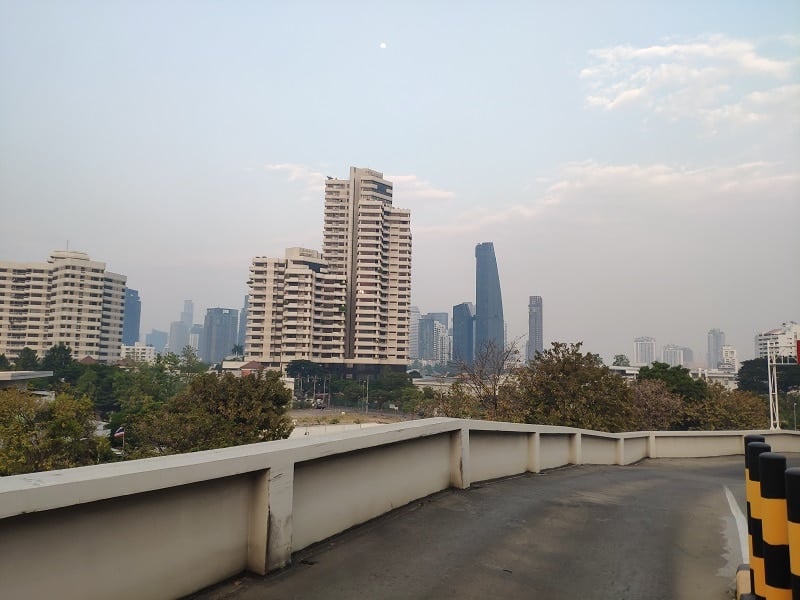
Unfortunately, because farmers in Thailand and the surrounding countries practice slash-and-burn methods of removing old crops, air pollution is expected to continue for the foreseeable future.
However, according to independent reports, the overall air quality (at least in Bangkok) is getting better each year.
There are ways to minimize your exposure to PM2.5. In fact, we’ve created a guide to Thailand’s air pollution to show you how.
Many nationalities can enter Thailand without a visa for 30 days. But if you plan to be here long term, you need the right visa.
Some people leave the country and return with a new visa exemption or tourist visa. This is called a visa run or border bounce, and it’s considered illegal.
When applying for a long-term Thai visa, make sure you get one that corresponds with your reason for moving to Thailand and have the right document.
Getting a business, marriage, or retirement visa, isn’t too hard as long as you have the right paperwork.
If you have some money to spend, the Thailand Elite visa is the best visa to get.
It’ll get you five to 20 years in the country, and with it, you won’t have to file the dreaded annual documents and paperwork required by other Thai visas.
Find out more: Non-Immigrant Visas to Thailand: an In-Depth Guide
Renting a condominium is the most popular option for expats in Thailand, especially for those who live in Bangkok. This is because condos tend to be in convenient locations near either a BTS or MRT station and also supermarkets.
Many condos even have a convenience store and a laundry shop right inside the building.
But condos can be small. Studio condos in Thailand are only around 25 square meters to 30 square meters. If you need more space, it’s better to rent a house, which is just as simple.
With a house, you’ll have more rooms for yourself and family members. Plus you’ll have a yard to hang out in. You do have to keep up with the leaves and yard, but labor is affordable in Thailand and you can always find someone to do that for you.
You can rent some condos by the month, although many of the better ones will require you to sign at least a six-month lease. A one-year lease is the most common.
To speed up the process of finding a rental, talk to a real estate agent. It’s basically free for you.
However, don’t rent a place long-term before arriving in Thailand unless it’s a part of a job offer. Even then you should ask if it’s possible to arrange a viewing when first arriving.
Instead, you should plan to spend at least the first few days or even weeks in a hotel or short-term rental. Book at least a few nights in a Bangkok hotel to figure out where you want to live.
Another short-term option is renting a Bangkok serviced apartment. You most likely won’t have to sign a lease at these places, but you will have to leave a deposit.
If you’re on a budget, look at hostelworld.com. But you won’t get a room with enough space for all your belongings if you’re moving here.
However, we’ve met a few people who arrived in Thailand and stayed in a hostel while looking for a job, and they all said that the lack of privacy and facilities made things hard.
No matter which choice you make, you can sometimes cut your rent in Thailand by 40 percent through negotiating. We show you how in this exclusive guide for our supporters.
Related articles:
For those looking for something more long-term, you can buy a condo in Thailand if:
To find out more, read our guide on buying a condo in Thailand.
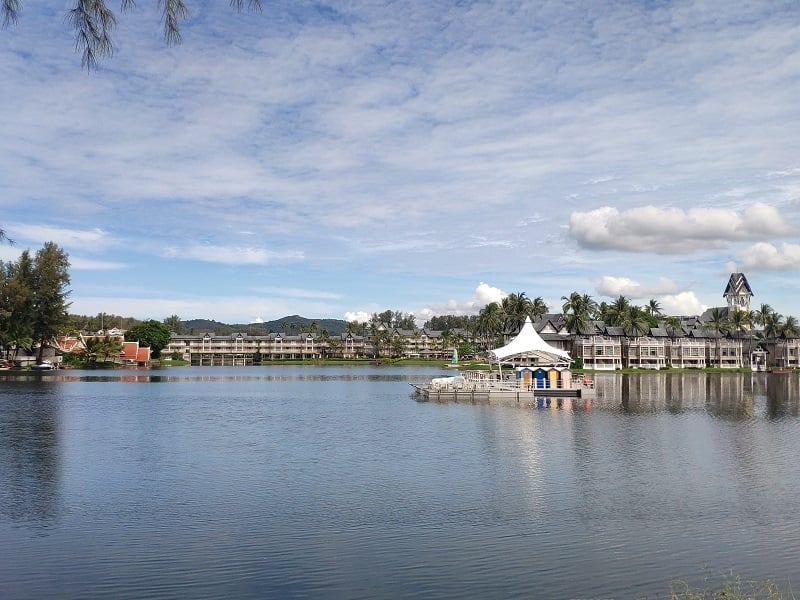
For other types of property, you can’t buy it. So, you’ll have to lease it for 30 or 60 years.
Your best bet is to talk to a property investment company such as Keller Henson. Then you can explain to them your situation.
They can help you find properties all over Thailand and assist you with the buying process.
Before moving to Thailand, it’s a good idea to think about where you want to live. Ask yourself these questions:
That said, here are some of the more popular expat locations and what you could expect from each of them.
Bangkok is the city most people first visit when they arrive in Thailand.
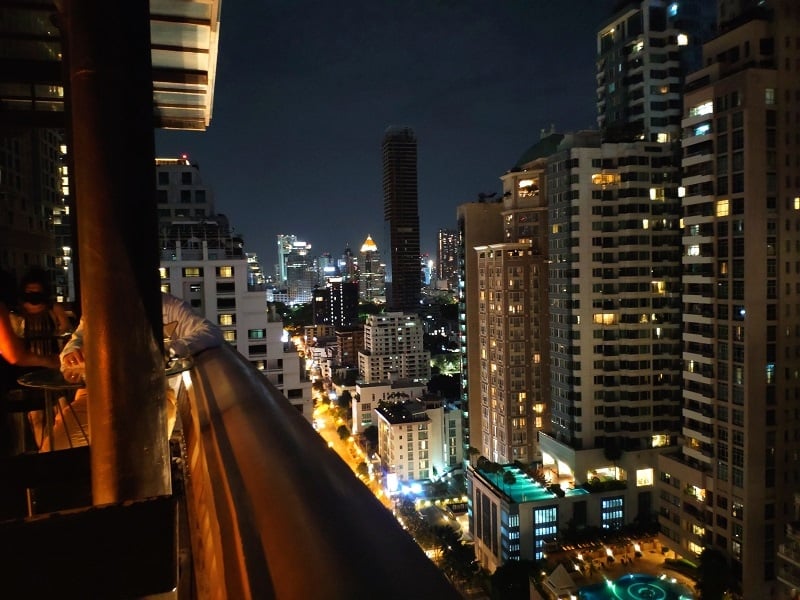
Here, you can find the best paying jobs, a variety of restaurants, malls, leisure activities, and people from all over the world. Bangkok is also the major transportation hub of Thailand – you can travel to anywhere via bus, train, or plane.
There are a few downsides to being in the capital, though.
The traffic is bad, some areas could get noisy, and things tend to be a lot more expensive here than elsewhere in the country.
However, if you want access to everything an expat needs, Bangkok is the place.
The home for digital nomads, long-term travelers, and retirees, Chiang Mai has long been a popular choice for expats in Thailand.

Chiang Mai offers beautiful mountainous scenery and plenty of outdoor activities, such as hiking, biking, camping, and more. But because it does have a city center, you’re never too far away from the province’s diverse array of food and people.
The downside to living in Chiang Mai comes between February and April, where the burning season makes the air you breathe hazardous.
But expats have figured out a workaround to this issue – they usually head to the south of Thailand or Bangkok until the pollution subsides and they can return home.
The nightlife and existing expat scene in Pattaya make it a popular destination for people looking to call Thailand their home.
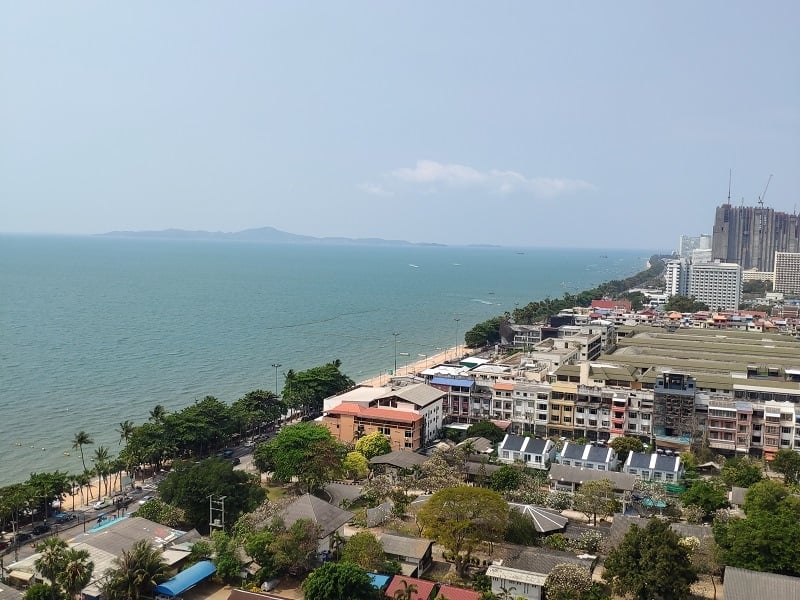
The city has a lower cost of living than Bangkok, the beaches are kept in good condition, and there is plenty of local and Western food to indulge in. Plus, pristine islands like Koh Kham are just an hour away.
Pattaya isn’t without its flaws, though. Some areas near the beach can get seedy and temptation lurks around every corner.
However, plenty of expats who raise families in Thailand live on the “dark side” of Pattaya – the section east of Sukhumvit Road – and they praise the city for all it has to offer.
Phuket is one of the most visited places in the world, but some expats love it so much that they plant their roots on the island.

Like some of the other popular areas for expats throughout Thailand, Phuket has it all – beaches, outdoor activities, international schools, and employment opportunities, especially in hospitality.
But be prepared to pay more for certain things here. Officially, Phuket is ranked the second-most expensive place to live in Thailand next to Bangkok. However, people who live on the island will tell you that Phuket is just as expensive, if not more, than its centrally-located counterpart.
If you enjoy island life, then Phuket may be the place for you.
Like Phuket, Koh Samui is another popular island with expats in Thailand and, over the recent years, more and more people have been making it their home.

It may not have the same level of international schooling, private hospitals, and the like, but it makes up for that in quality of life. On Koh Samui, you’re never too far from a pristine beach.
Koh Samui also hasn’t yet been hit with the same price increases as Phuket, so condos, houses, and food tend to be a little bit cheaper here.
Also, the island has a variety of international restaurants where retired expat chefs tend to work to keep up with their craft.
One downside to living on Koh Samui is that, unlike in other parts of Thailand, expats don’t tend to stay very long. The island is still known primarily as a place to party, so people often come and go, making it hard to find long-term friends.
Just two and half hours south of Bangkok is Hua Hin, a popular beach town destination for many retired expats in Thailand.
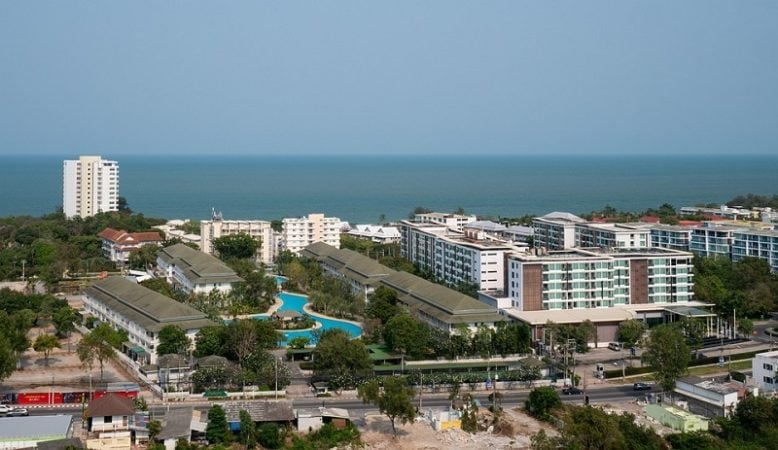
Hua Hin has everything you’d expect from a retirement destination, including affordable houses, private hospitals, and quality of life. For those who aren’t retired yet, the city has international schools, a hip local scene, and plenty of nightlife.
There aren’t many downsides to living in Hua Hin, but it’s small and quiet. Depending on your personality, you will either like this lifestyle or not. It’s also a bit far from Bangkok according to some, and hospital choices are a bit limited.
But if you don’t have to travel the capital very often, then this beach town could be the place for you.
The Northeast of Thailand, or Isan, is famous for farming and is a common place for retired expats to relocate to. Most retired expats living in this region have Thai spouses and/or kids.
If you’ve never lived in a rural area, Isan may take some getting used to, as everything you do requires a car and a great deal of patience because things move at their own pace.
But if you don’t mind being surrounded by vibrant green rice fields in the rice growing season, this could be one option – just don’t expect to find too many jobs in this area.
Popular banks in Thailand are:
They all work the same. If you work in Thailand, your employer may ask you to open an account with a specific bank so that you can receive your salary.
To open an account, bring you work documents, visa, and passport, and the bank will walk you through the process. You’ll get an ATM card that day that you can use to shop online and off.
You can start by going to the nearest bank branch and asking about the requirements.
If you have a work visa, you’ll have no issues opening an account.
One of our writers even opened an account on his marriage visa. It took some asking around, but eventually he came across a KrungThai branch that was willing to give him an account.
Many banks won’t let you open an account on a tourist visa, but if you ask around enough, you may find one willing to give you an account.
Read more: Opening a Thai Bank Account: A Guide for Expats and Tourists
The first thing expats want to do when arriving in Thailand is set up their phone and internet.
There are three main phone companies in Thailand:
They are all the same and offer a variety of plans based on whether internet or phone calls are more important to you.
Thais mostly rely on messaging apps such as Line or Facebook Messenger. For around THB300 per month you can get a package with a decent amount of internet data and a hundred or so minutes of call time.
Home internet is more dependent on where you live and the services offered in the region. Most internet companies try to sell you an internet and TV package.
This works out to around THB800 per month and includes a few English channels. For this amount, you should expect at least 200 MB of internet speed, a simple TV package, and 5G phone service.
If TV is your thing then prepare to pay what you would back home to get movies and live premium TV (sports, Western channels, etc).
Find out more:
Here’s what you need to do to prepare your shipping to Thailand.
You can bring everything you need with you to Thailand – although, to be honest, this isn’t the most efficient way of going about this.
Since you can buy most things you use back home in Thailand, you don’t have to bring everything with you, but quality furniture and electronics are more expensive here, so it’s best to ship those things from home.
The items that are usually more expensive in Thailand are:
Big size clothes, especially shoes, can be hard to find in Thailand.
If your company is relocating you to Thailand, you might not have to worry about shipping your things to the country, as they’ll do it for you.
But if you’re coming here on your own accord, you need to figure this part out yourself. Luckily, we have a shipping to Thailand guide that you can use to help pick an international mover and method.
If you’re ready to pack your bags and your bags include more than you can carry onto the plane, you can get free quotes from moving companies.
One thing you’ll learn about Thailand is that officials here love paperwork.
We’ve come to dread how many copies of our driving licenses, passports, and school degrees are floating around various government offices.
Below we’ve put a list of important documents you must bring. If possible, bring original copies with you.
There’s also the chance you’ll need these documents either translated into Thai or verified by your embassy.
The Thai government doesn’t accept civil partnerships or gay marriage certificates. This may change in the future, so keep updated on this via the media or your embassy.
You should sign, date, and double-line strikethrough any photocopied documents.
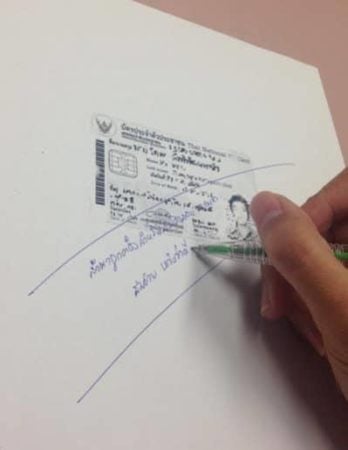
Write a sentence stating what this signed copy is for as well. This way if there are any dishonest people who get hold of these copies, they won’t be able to use them.
It’s possible to bring your furry friend with you to Thailand, but make sure it will be able to handle the tropical climate.

There’s a trend of buying Siberian Huskies in Thailand, but since this breed loves cold weather, it might not be able to adapt to the tropical climate.
For more info, check out some of our popular pet guides:
You can find international schools throughout Thailand.
Schools that follow the same curriculum as the one in your home country or your child’s previous school makes it easier for your kids to adapt. It also makes it easier if or when you move back to your home country.
If you live in Bangkok or Chiang Mai, there’s a wide range of curriculum available. These include:
International schools in Thailand can be broken down into four tiers, from Tier 1 to Tier 3.
Tier 1 is the most expensive. You should expect to pay around 600,000 baht to 1,000,000 baht a year in tuition.
A local school, on the other hand, offers your child the opportunity to immerse themselves in Thai culture. They can also get a deeper understanding of the language.
Local schools are cheaper than international schools. But prices alone are not a good indicator of whether a school is the right fit for your son or daughter. They don’t represent the quality of education offered at the school either.
Find out more: How to Pick the Best International Schools in Thailand for Expats
When you move to Thailand, taxes will be a part of your reality, just like anywhere else in the world.
Value-added tax, or VAT, in Thailand is calculated at 7 percent across the board. This goes for foods, goods, and some services.
If you work in Thailand, you have to worry about another kind of tax – income tax. You are taxed according to how much you make on anything after THB150,000 per year.
From there, the tax rate increases from 5 percent all the way to 35 percent, depending on how much you bring home every year.
| Personal Taxable Income in Thai Baht | Tax Rate |
| 0-150,000 | Exempt |
| 150,000-300,000 | 5 percent |
| 300,000 – 500,000 | 10 percent |
| 500,000 – 750,000 | 15 percent |
| 750,000 – 1,000,000 | 20 percent |
| 1,000,000 – 2,000,000 | 25 percent |
| 2,000,000 – 4,000,000 | 30 percent |
| Over 4,000,000 | 35 percent |
In addition to these taxes, you also have to pay into Thai social security, which comes out to THB750 per month.
Like other countries, you can take advantage of tax deductions in Thailand. Popular choices include buying SSF, paying for life insurance, and purchasing a condo. Expat and Thai workers get the same deductions.
For more info on Thai taxes, check out these guides:
After your first few years, you’ll pick things up and over time become more understanding of how and why things happen like they do in Thailand. We can’t cover everything related to Thai culture in this section, but we’ve put a few basic points below.
Thais really respect their elders. This means the pecking order may be different from your own country. Young people will greet their elders with a wai, the traditional Thai greeting, which elders may or may not return.
Some elders make decisions for and give advice to the younger people in the family. It also seems to me some Thai people do things to please the older members of their families, such as when choosing degrees or picking a career.
One aspect of Thai culture that is hard to understand is that people don’t like to say “no.” Even the Thai word mai-chai, meaning “no,” translates to “not yes.”
This creates confusion as people will say “yes” when they have no intention of doing what they have agreed to. Often, there are certain visual or situational clues they give that you have to pay attention to.
They hope you’ll pick up to understand they meant “no.” We’ve had workmen not turn up, services not provided, and drama caused over this. It used to leave us frustrated, but we’ve begun to pick up on these little clues to know when “yes” means “no.”
One of the first Thai phrases you’ll learn is mai bpen rai, or never mind. We find that there is a “never mind” attitude from lots of people here in Thailand, both locals and expats. This frustrates some expats, as it seems people don’t care. But that’s not always the case.
It’s common for Thai people to live with their family until married, but this is changing with the younger generation. Asking a partner to move in before marriage might prove hard, especially among traditional families.
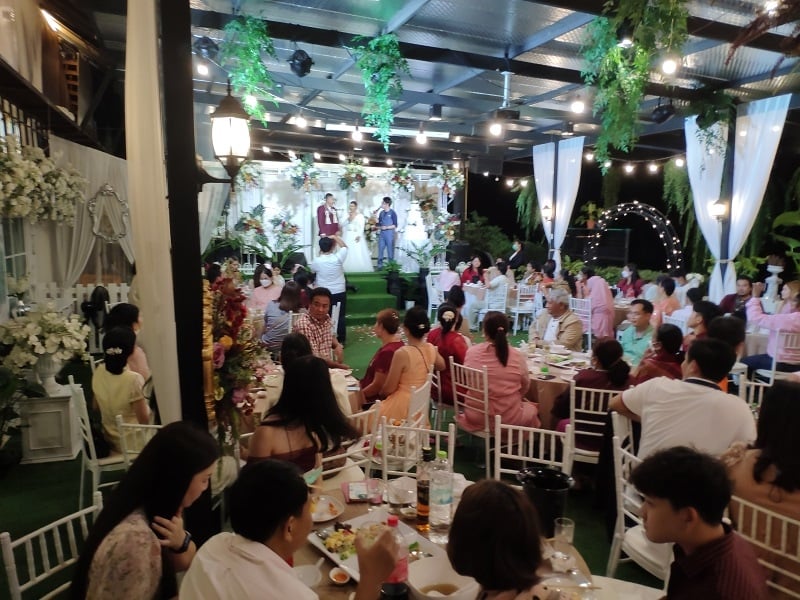
We’ve even met couples who live in different provinces due to work or supporting a child through university or school in a different region.
This part is interesting and is something some expats struggle with, at times. Some people aren’t committed to living in the country long-term. This makes long-lasting friendships harder to find.
We’ve managed to make some good friends here, though they have all come through work or neighborhood.
Thai friends are even harder to make. Expats may only be able to make one good Thai friend, but you should value that friendship.
In tourist areas it’s true there are other Westerners, but it isn’t always obvious who is here on vacation and who is here long-term.
There are also social clubs from golf to football teams where you can meet people. Your best bet to find these is to search on either Google or Facebook for the club that interests you.
It’s also possible to make friends with people randomly. Living in a condo can help you meet other expats.
In local restaurants, you can meet people. In general, you don’t have to go looking for friends, but find yourself lucky enough to make a few good ones while here.
The final way to make friends is through your girlfriend or boyfriend. If you have a Thai partner, they may be able to introduce you to some Thai friends.
When people think of nightlife in Thailand, they often envision the party scenes dotted throughout the country. However, that makes up just one small portion of Thailand’s nightlife.
There’s also quiet walks in the park, jazz music along the river, musicals, movie theaters, concerts, festivals, outdoor restaurants on the beach, in addition to the partying.
Whatever you enjoy doing at night, Thailand will have it on tap. You just have to spend enough time here to get to know your options.
For the most part, you can follow this guide to a T and smoothly transition from the United States to Thailand.
In short though, we can list a few of the pros and cons of moving from America to Thailand.
Being an American in Thailand is not that difficult. For one, the US Dollar goes far in Thailand. So, if you come here with a decent savings, you can afford a comfortable lifestyle.
Also, more opportunities in the workforce (especially teaching) open up to Americans who are also native English speakers. Thai parents often want their children to sound American rather than English or Australian or Filipino, so they request American teachers.
There are some drawbacks to being an American, though. One of them is that people tend to stereotype you. They think you live on either end of the spectrum – either you have money out the wazoo or you’re here for less than skillful things.
If you’re into watching videos, Kylie Abroad has a YouTube video about what she wish she knew before moving to Thailand as an American. It reveals a lot of insights from a female’s perspective.
Related articles:
One of our friends, Carl, let us know what his biggest challenges in the country are as a British expat, and what he likes best about living in Thailand.
As for challenges, he said he doesn’t like when the admin from his daughters’ school uses their photos to advertise to Thai parents that luk krueng – or mixed-race children – go to the school. They did this, he said, without his permission.
But he loves that his life is simpler here in Southern Thailand. He doesn’t have to work as much as he would’ve in the U.K. to afford a comfortable lifestyle while still having time to spend with his family.
Read more: Moving to Thailand from the UK: How and Why I Did It
Dan, a friend of one of our editors, is from Australia and gave his input on living in Thailand. One of his main choices for moving here was the lower cost of living. He said it’s becoming harder and harder to raise a family in Melbourne due to the increasing food and property prices.
He is also able to send his children to a private school in Bangkok, which he would never be able to do in Australia.
Since he owns a company in Thailand, he does face many challenges. His biggest is that everyone in the chain of business has to get paid for any deals or selling of products and services. This increases his costs, which he then has to pass on to his customers.
We don’t yet have a guide on moving to Thailand from Australia, but our guide on Ditching the Desk at 53 and Retiring in Thailand was written by two Australians. There are a lot of key takeaways in the article for those coming from Australia, so be sure to give it a read.
We have an entire section of our site dedicated to Canada, but like Australia, we haven’t yet published a detailed guide on moving to Thailand from the Great White North.
However, Greg Jorgensen – one-half of The Bangkok Podcast – hails from Canada and often talks about the experience of moving to Thailand on the show.
An avid reader of ExpatDen, Vinny – from Montreal, said that his biggest challenges weren’t so much in Thailand, but in returning to Canada. After being in Thailand for 15 years, he’s lost touch with the things that people talk about back home. So, when he visits Canada every year, he feels extremely out of place.
Within Thailand, Vinny said he still faces a lot of the challenges that some other expats have. First, he’s tattooed from head-to-toe, so he’s often judged for his appearance. Second, the Canadian Dollar doesn’t go as far as the U.S. Dollar. Because he owns rental property in Canada, his income fluctuates with the exchange rates.
As for the pros of living in Thailand as a Canadian, that was easy for Vinny to answer. He has escaped the bitter-cold winters of the north for the year-round warm climate of Thailand.
Despite what people say, you can become a permanent resident in Thailand.
In a nutshell, you must fall into one of the five categories to apply:
Each one of these categories come with their own separate requirements that you must meet, so be sure to check the link below to find out more.
In general, you need to live in Thailand for at least three years under the same non-immigrant type visa, whether that’s a business visa, marriage visa, or dependent visa.
You also need to meet the requirements for each category above. With investment, for example, you have to invest at least THB10 million into one of the given options.
With the humanitarian option, you have to be married to a Thai citizen for at least two years or be the mother or father of a Thai child.
As a permanent resident, you no longer have to do 90-day reports, you won’t need residence certificates, and you can apply for Thai citizenship after five years – just to name a few of the perks.
Read more: Thailand Permanent Residence: Cost, Requirements, and Procedure
It’s always good to be prepared for emergencies. Should you ever need it, here’s a list of emergency phone numbers in Thailand.
| Contact | Number |
| Police | 191 |
| Tourist Police | 1155 |
| Highway Police | 1193 |
| Public Ambulance | 1669 |
| Private Ambulance | 1724 or 1719 |
| Fire Department | 199 |
To summarize everything you must do to move to Thailand, here’s a checklist.
Here are some of the most important guides you must read when moving to Thailand:
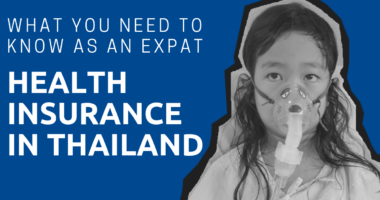 Health Insurance in Thailand: What You Need to Know as an Expat in 2024 2024-02-06 As an expat in Thailand, you might be wondering why you should obtain health insurance here. While the cost of… ... Read more
Health Insurance in Thailand: What You Need to Know as an Expat in 2024 2024-02-06 As an expat in Thailand, you might be wondering why you should obtain health insurance here. While the cost of… ... Read more My Personal Tricks on How to Learn The Thai Language Fast 2023-12-05 Hello, I'm Ben. In 2017, I started a remarkable journey learning Thai after moving to Thailand. I have had to… ... Read more
My Personal Tricks on How to Learn The Thai Language Fast 2023-12-05 Hello, I'm Ben. In 2017, I started a remarkable journey learning Thai after moving to Thailand. I have had to… ... Read more Thailand Elite Visa Review: What You Should Know Before Applying (2023) 2023-12-25 Have you heard of the Thailand Elite Visa? It was introduced in 2003 after the Thai government approved the Thailand… ... Read more
Thailand Elite Visa Review: What You Should Know Before Applying (2023) 2023-12-25 Have you heard of the Thailand Elite Visa? It was introduced in 2003 after the Thai government approved the Thailand… ... Read more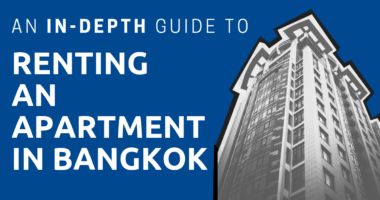 An In-Depth Guide to Renting an Apartment in Bangkok 2024-01-24 Before I moved to Bangkok, I looked up some places to live online. I thought it would be easy since… ... Read more
An In-Depth Guide to Renting an Apartment in Bangkok 2024-01-24 Before I moved to Bangkok, I looked up some places to live online. I thought it would be easy since… ... Read more How to Send Money to Thailand: The Fast, Cheap, Reliable Way 2024-03-01 Get the most baht for your buck by using these money transfer services. ... Read more
How to Send Money to Thailand: The Fast, Cheap, Reliable Way 2024-03-01 Get the most baht for your buck by using these money transfer services. ... Read more The Company Registration Guide in Thailand for Foreigners 2024-01-29 When it comes to registering a company in Thailand, there are many choices and options available to foreigners. You can… ... Read more
The Company Registration Guide in Thailand for Foreigners 2024-01-29 When it comes to registering a company in Thailand, there are many choices and options available to foreigners. You can… ... Read more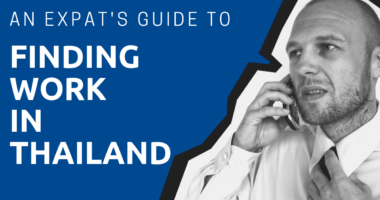 An Expat’s Guide to Finding Work in Thailand 2024-02-20 Is finding a job in Thailand easy or hard? This depends on who you ask or what you read. For… ... Read more
An Expat’s Guide to Finding Work in Thailand 2024-02-20 Is finding a job in Thailand easy or hard? This depends on who you ask or what you read. For… ... Read more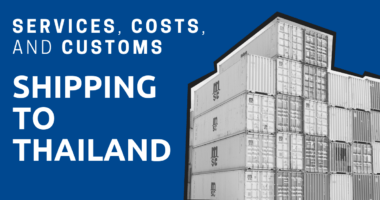 Shipping to Thailand: Services, Costs, and Customs 2023-11-20 Shipping a letter or package to Thailand? Moving to Thailand and need to send all your belongings here? You’re probably… ... Read more
Shipping to Thailand: Services, Costs, and Customs 2023-11-20 Shipping a letter or package to Thailand? Moving to Thailand and need to send all your belongings here? You’re probably… ... Read more Opening a Thai Bank Account: A Guide for Expats and Tourists 2023-09-28 One of the first and most essential things expats need to figure out in Thailand is how to open a… ... Read more
Opening a Thai Bank Account: A Guide for Expats and Tourists 2023-09-28 One of the first and most essential things expats need to figure out in Thailand is how to open a… ... Read moreFind common topics that will help you overcome the challenges of living, working, retiring, and starting businesses in Thailand.
Find your dream rental on Thailand’s most pristine island.
How to find the right home for you and your family.
Save time and money by working with a vetted real estate agent.
When looking for car insurance in Thailand, Viriyah Insurance is going to be one of the very first companies that come up. Although the name … Read more
Teaching English as a Foreign Language (TEFL) has long been a convenient way for former tourists to stay in the ‘Land of Smiles’ long-term. Native … Read more
Thailand offers an abundance of exciting and educational summer camps for all interests and age groups, from the beach to the sporting arena, from the … Read more
Everything you must know to secure a house or condo in the northern province.
How to find the most suitable place on the island for your taste and budget.
A simple guide on how to prove your residence when opening banks accounts, applying for a driver’s license, and more.
Cosmetic Dentistry refers to any dental work specializing in improving the appearance of your teeth, gums, or smile. Whether you’re looking to fix a broken … Read more
Getting dental implants is a big deal. If done well, It will be a procedure that you need to undergo only once because it is … Read more
A detailed guide on how to submit your TM.47 at your local Thai immigration office.